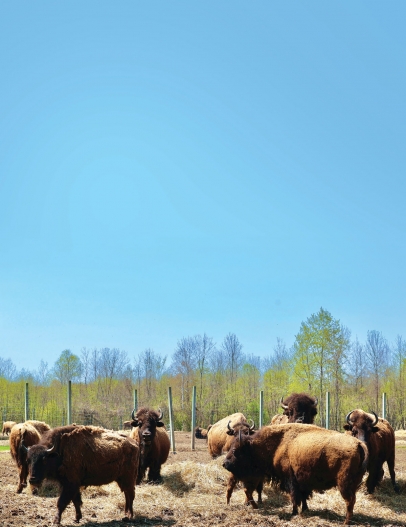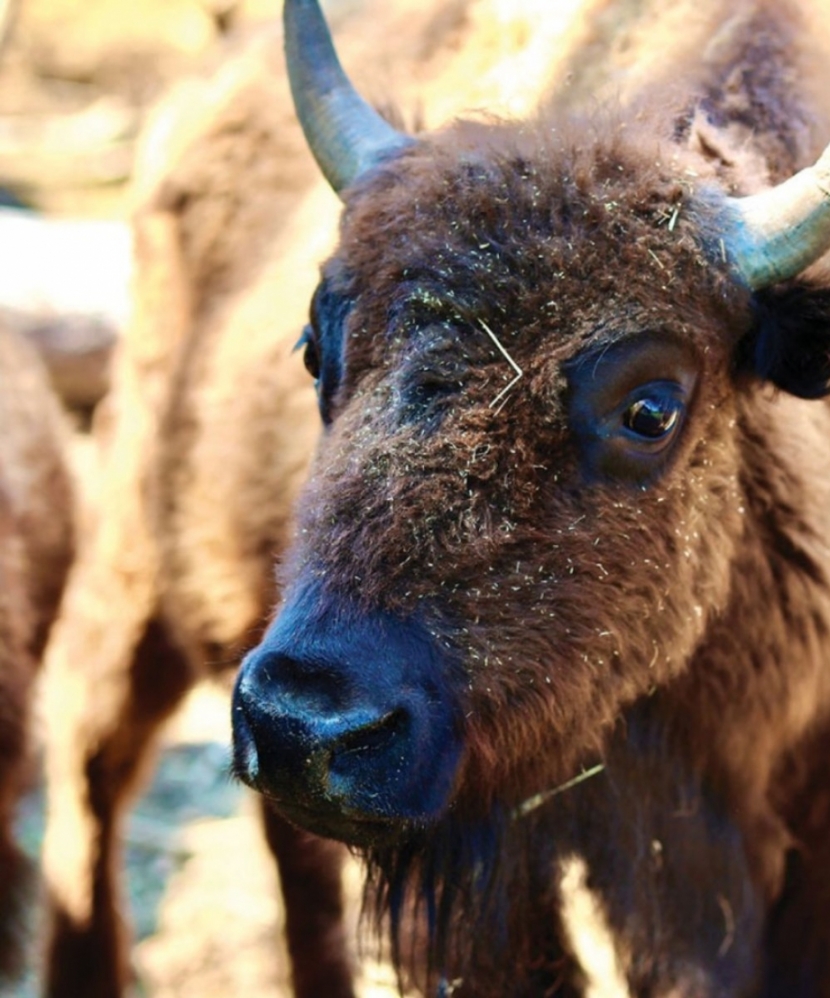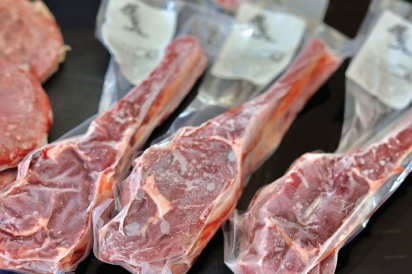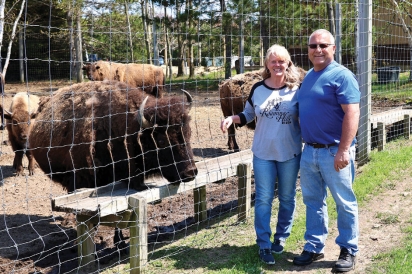'It's All About the Animals'
FOR MANY, purchasing locally grown food and supporting local farmers are priorities. But when it comes to meat raised locally, distinguishing the various growing practices can be confusing. What should consumers consider? There’s a lot of buzz about sustainability, but in terms of meat, what does that really mean? Are the animals fed differently? Are there nutritional differences in the meat? Does it actually taste better?
We asked two farmers to tell us about their practices, the reasons behind them and the benefits of local, pasture-raised meat.
Roaming Hills Bison
Debra and Al White have raised bison in Washington Township for 12 years. A former inspector with the USDA Food Safety and Inspection Service (FSIS) and meat manager for Meijer supermarkets, Al watches over the bison from the day they are born. His wife, Debra, owns and manages the business, making Roaming Hills the only woman-owned bison farm in the State of Michigan and only one of three in the United States.
After breeding elk for many years, the Whites began raising bison for a variety of reasons: One being that they simply fell for this majestic, docile species of buffalo that is indigenous to the United States and Canada.
“For us, it’s all about the animals,” says Debra. “We just love them so much.”
“The history of the bison over the past 200 years is incredible. They made it through the Ice Age!” says Al.
The health benefits of bison are also impressive. According to the USDA, bison is lower in fat, calories and cholesterol than beef, pork, chicken or salmon, and high in protein, iron and vitamin B-12.
“As a farmer, I believe that if the animal is comfortable and happy, that’s reflected in the quality of the protein. Stress is not healthy for us; why would it be healthy for the animals?”
—Al White, Roaming Hills Bison
“It’s as close in flavor to beef as you can come, with a slightly sweeter taste, without being gamey,” says Al. “That’s because bison naturally graze off pasture grasses. They do not survive in feedlots. They require a large amount of land, much more than cattle. We rotate ours onto different pastures every few weeks with fresh grasses and hay. As a farmer, I believe that if the animal is comfortable and happy, that’s reflected in the quality of the protein. Stress is not healthy for us; why would it be healthy for the animals?”
He continues, “Bison are very tough animals, ones you don’t have to handle a lot. The more you leave them alone, the happier they are. They can live about 50 years. A cow has a lifespan of about 15% of that.”
The Whites currently have 33 bison in a closed herd to help control the health
Demand for their meat outweighs supply, and Roaming Hills regularly sells out at the Frankenmuth, New Baltimore and Shelby Township farmers markets. As demand increases, they aim to gradually increase the herd.
“At the markets, you can taste our products before buying,” says Al. “We love the personal interaction with customers, and we encourage them to ask questions.”
“We’re not just selling bison,” says Al. “We want to educate people about the animals and give them the opportunity to taste it and teach them how to cook it. Bison is more expensive than beef, so you want to use that premium piece of meat to the best of your ability.”
When purchasing meat, Al recommends asking questions. “Ask how the animals are fed. Do they use hormones and antibiotics? Are they grain-fed or grass-fed? Are they pastured? Do you rotate pastures? Who does their processing?”
The Whites plan to open a market on the farm, where customers can purchase products and learn about bison. Customer relationships are so important that Al personally delivers customer orders free of charge. “How much more can a customer trust me than when I am personally delivering the product right to their door?
“I’ve seen both sides of the industry and there is an absolute difference in local eggs and pasture-raised meats. Bison is one of the healthiest proteins in North America and we are proud to be able to provide it to our local community.”
Burgher Family Farm
Although Jay Burgher had no background in farming, his desire for self-sufficiency and a healthier, family-centered lifestyle led him to raise pork on his Armada farm.
“I wasn’t finding the quality of food that I wanted for my family, so we started doing it ourselves. We started with nothing, really. We began raising a few chickens and an opportunity presented itself for us to raise a rare pig on a very small scale,” he says. “An American Guinea Hog was given to us for free and five years later, we are one of the biggest breeders of American Guinea Hogs in the United States, and the biggest in Michigan.”
According to The Livestock Conservancy, the breed is unique to the United States and suitable for small family farms, because of their moderate size, friendly nature and flavorful meat. The breed is listed as “threatened,” meaning that fewer than 5,000 exist globally, and not even 1,000 in the United States. Breeders like Jay are working to change that.
“They are very cool animals, and thrifty: They don’t eat as much as commercially raised hogs,” he says. “They offer a phenomenal culinary experience that’s more flavorful than traditional pork, with a buttery fat. The lean-meat-to-fat ratio is more balanced, so it’s harder to dry them out. You don’t even need the applesauce.”
As a baseline, Burgher provides his hogs with a soy- and corn-based feed. As they forage with the seasons, he works with a nutritionist to adjust the feed, reducing or eliminating the soy and corn, with the aim of eventually being free of both.
“Our focus is on naturally occurring food sources, including silvopasture and woodlot forage. These animals are well-equipped to forage and have the instincts to know what to eat and how to find it, such as bugs, worms, fallen leaves, acorns, hickory nuts and small plants. You can imagine the wide variety of nutrients they get from foraging and that is what we ideally want. Our goal is to have them be completely on pasture.”
“Animals raised properly and with access to pasture are much healthier,” says Burgher, “and that’s healthier for us. The animals seem happiest when they are able to follow their natural instincts and are fulfilled—to forage, to be good moms—and their happiness helps produce a really good-tasting product.”
“These animals are well-equipped to forage and have the instincts to know what to eat and how to find it, such as bugs, worms, fallen leaves, acorns, hickory nuts and small plants. You can imagine the wide variety of nutrients they get from foraging and that is what we ideally want.”
—Jay Burgher, Burgher Family Farm
He describes sustainability as utilizing naturally occurring food sources, with fewer inputs from outside your system. To do this, he started a nonprofit cooperative, helping other people get started in farming, supplying them with animals and mentorship.
Bison Nutrition
From the National Bison Association website: Bisoncentral.com/bison-nutrition-cooking
NUTRITIONAL COMPARISONS per 100 grams (3.5 oz.) serving cooked meat
|
SPECIES |
FAT (G) |
PROTEIN (G) |
CALORIES (KCAL) |
CHOLESTEROL (MG) |
IRON (MG) |
VITAMIN B-12 (MCG) |
|
Bison |
2.42 |
28.44 |
143 |
82 |
3.42 |
2.86 |
|
Beef (Choice) |
18.54 |
27.21 |
283 |
87 |
2.72 |
2.50 |
|
Beef (Select) |
8.09 |
29.89 |
201 |
86 |
2.99 |
2.64 |
|
Pork |
9.21 |
27.51 |
201 |
84 |
1.0 |
0.68 |
|
Chicken (Skinless) |
7.41 |
28.93 |
190 |
89 |
1.21 |
0.33 |
|
Sockeye Salmon |
6.69 |
25.40 |
169 |
84 |
0.50 |
5.67 |
Source: USDA National Nutrient Database for Standard Reference. Updated January 2013
“I’ve found that most customers who buy quality meat are interested in raising it themselves, because they can’t find it. I’m working with 4-H kids to pave the way for a more sustainable homesteading style. You don’t have to be hardcore farmers to raise this type of pig in a backyard.”
Burgher sells whole hogs to customers directly from his farm and through Artisan Direct Distributing, which he established for cooperative members to sell their products together. He also sells directly to stores, at Armada’s Armade in MI and to area chefs and restaurants.
He encourages people to develop a relationship with a farmer that they trust. “Once you have that and you know they are doing things properly, that’s the most important thing.
“For my family, growing our own food feels very good. There’s a great deal of independence knowing where it came from. It’s important for everyone to know where their food comes from.”
Learn more about Roaming Hills Bison, based in Carsonville, by calling 810-537-1292 or sending an email to amwhite32463@gmail.com. Find their products at Frankenmuth Farmers Market, New Baltimore Farmers Market, Shelby Township Farmers Market and by Thanksgiving at Eastern Market in Detroit, or by calling. Their new farm market should open by late summer.
Learn about Burgher Family Farm at Facebook.com/burgherfamilyfarm/. Purchase products at Armade in MI, 23009 E. Main St., Armada, and through Artisan Direct Distributing at 248-736-4353.
Janice Benson is a freelance writer and executive director for the Michigan Agritourism Association.







